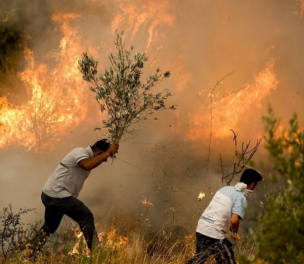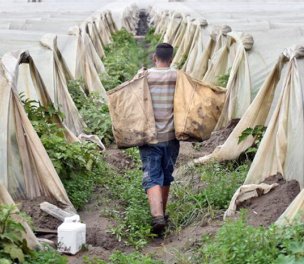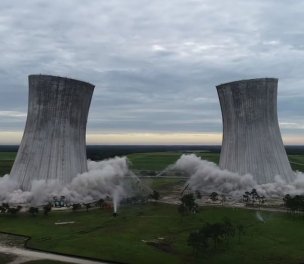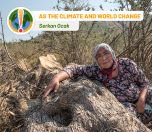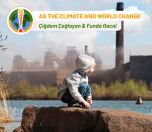* Credit: IOM
Click to read the article in Turkish / Kurdish
Climate change has been affecting our lives in all areas. One of the problems created by this situation is that people must leave the places where they live, because it is no longer livable.
The United Nations High Commissioner for Refugees (UNHCR) stated that by the end of 2020, the number of displaced people was at least 82.4 million.
The number of people displaced due to climate is estimated to be between 250 million and 1 billion by 2050.
There is no country on the face of the earth which has not experienced the effects of the climate crisis, but this situation mostly affects the people in underdeveloped and developing countries. Countries only a few meters above sea level, especially Pacific Island countries and South Asian countries such as Bangladesh, India, and Pakistan, are at risk.
The natural consequence of an unnatural situation
People are faced with short-term climate disasters such as heavy rainfall, droughts, and hurricanes or relatively long-term disasters such as the elevation of the sea level, soil infertility in agricultural fields due to increased salinity, desertification, and erosion.
It causes them not to be able to continue their lives, and as a natural consequence of this unnatural situation, they have to migrate within their country. The prevalence of these conditions throughout the country forces people to go abroad, seek asylum, and seek protection.
In this case, is it possible for people to obtain refugee status?
Who is a foreigner?
.jpg)
The concept of "foreigner" is generally used to describe a non-citizen in various country laws, but it can be used to cover different people in other countries.
In terms of inclusivity, it is more appropriate to use the term to include refugee, stateless, immigrant, and foreign legal persons.
In Turkey, the Law on Residence and Travel of Foreigners (YISHK) has the concept of "foreigner", Passport Law has "foreigner" and "foreign citizen", and Law on Foreigners and International Protection (YUKK) has "foreigner."
Article 3/1 of the Law on Foreigners and International Protection defines a foreigner as "a person who does not have citizenship ties with the Republic of Turkey."
Who is a refugee?
The concept of a refugee was defined in the 1951 Geneva Convention Relating to the Status of Refugees.
According to Article 1/A-2 of the Convention, a person who has a well-founded fear of being persecuted in the country in which she or he lives due to her or his race, religion, nationality, political opinion, and membership in a particular social group, therefore, she or he cannot benefit from the protection of that country and seeks protection from another country by claiming one of these reasons is an asylum seeker; and the status she or he has is a refugee.
In addition, it is stated that people cannot be sent back (non-refoulement) to countries where their life or freedom will be threatened due to one of the five reasons listed in Article 33, Paragraph 1 of the Convention.
However, the second paragraph of the article states: "The benefit of the present provision may not, however, be claimed by a refugee whom there are reasonable grounds for regarding as a danger to the security of the country in which he is, or who, having been convicted by a final judgment of a particularly serious crime, constitutes a danger to the community of that country."
In other words, an asylum seeker can obtain refugee status under the convention only if she or he has a well-founded fear of being persecuted in their country of origin for one of the five reasons counted as a limitation.
Climate refugee
Although the concept of climate refugee is thought to be a new concept, it was created in 1985 by Essam El-Hinnawi from the United Nations Environment Program (UNEP).
Climate refugees are defined as "people who have been forced to leave their traditional habitat, temporarily or permanently, because of a marked environmental disruption (natural and/or triggered by people) that jeopardized their existence and/or seriously affected the quality of their life."
Again in 1990, it was stated in the Intergovernmental Panel on Climate Change (IPCC) that the heaviest result of climate change could be the massive migrations of millions of humans.
However, in terms of legal protection, a will in the international public opinion has not been put forward; and a successful attempt has not been made for people in this situation to gain status.
.jpg)
Climate refugees are excluded from the definition
As stated above, the definition of a refugee was based on the 1951 Convention definition, so climate refugees were excluded.
In some sources, it has been discussed whether climate refugees can be considered to be belonging to a particular social group, which is one of the five reasons indicated in the Convention.
For example, African Americans in New Orleans were affected more than other social groups by Hurricane Katrina in 2005. Also, women are more affected by climate change than men. However, it is stated that they cannot have refugee status according to the Convention.
As a matter of fact, UNHCR's Handbook on Procedures and Criteria for Determining Refugee Status says that victims of environmental disasters are outside the scope of the convention in obtaining refugee status.
However, even though they are considered to be outside the scope of the convention, it may be possible that the right to life of these people is violated or that they are subjected to ill treatment if they are sent back to their country of origin from their country of asylum.
In this case, if the country they go to is a party to the European Convention on Human Rights (ECHR) or the United Nations Convention on Civil and Political Rights (UNMSHS), they will have the right to apply to the supervisory bodies determined by the convention for the violations of their rights due to their return.
National legislation in terms of asylum law
The national legislation on refugees basically consists of the Law on Foreigners and International Protection (YUKK) numbered 6458 and the Temporary Protection Regulation.
Article 61 of the YUKK, in terms of the concept of refugee, is in full compliance with the definition in the 1951 Geneva Convention.
However, it gives refugee status only to those who seek asylum due to events taking place in Europe, keeping the geographical restriction that was optionally introduced with the 1967 New York Protocol.
In other words, it covers only forty-seven countries that are members of the Council of Europe. For this reason, to provide protection to those who cannot obtain refugee status in the law, conditional refugee status is regulated in article 62 of the law, and subsidiary protection status is regulated in article 63 of the law.
Temporary protection status
Another status is the Temporary Protection, which is given by a decision taken by the President in cases where individual status determination procedures cannot be carried out for those who took refuge in the country with a mass influx or during the period of mass influx.
In Turkey, we see its example in the case of Syrians who took refuge in our country due to the Syrian civil war, stateless people in Syria, and refugees. This status is regulated in Article 91 of the YUKK and Article 7 of the Temporary Protection Regulation.
When the current legal regulations are examined, it is seen that people who are displaced due to climate cannot obtain refugee status within the Asylum Law in effect in Turkey.
However, there is no legal obstacle for Turkey to grant Temporary Protection with a Presidential Decision for asylum seekers who came to Turkey because of climate disasters.
In this respect, we can say that the only possible situation in which individuals can obtain protection under the Asylum Law in Turkey, if their conditions are met, is to benefit from the Temporary Protection Status.
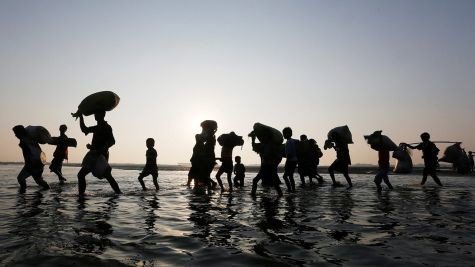
Climate refugees and the principle of non-refoulment
Removal is regulated in Article 54 of the YUKK and the fourth part of the Implementing Regulation between Articles 51 and 54. In these articles, it is stated on what grounds people can be deported.
However, Article 55 of the law also states that "those who have serious indications to believe that they will be subjected to the death penalty, torture, inhuman or degrading punishment or treatment in the country to which they shall be returned to" cannot be deported.
The European Court of Human Rights (ECtHR) and the United Nations Human Rights Committee (UNHRC) interpret the prohibition of refoulement specified in the 1951 Geneva Convention in a broader sense in case of deportation of persons.
Ruling of rights violation may be given
Regardless of the reasons for their arrival, if their life, material, and moral integrity are harmed, or they are ill-treated in the country to which they will be sent, the ECtHR or the UNHRC can state that their rights have been violated.
As a matter of fact, various decisions of the ECtHR claim that states have a positive obligation to prevent environmental degradation and the applicants' right to life is violated due to their failure to fulfill this obligation. [1]
However, there is no precedent decision that states departure of people violated the right to life or the ban on ill-treatment due to climate change. It should be noted that the deportation files are among the negative obligations that the states must fulfill.
Applications will increase
Since the ECtHR has not decided on an application claiming that she or he should not be sent back due to climate change, it is a matter of curiosity what will be the direction its evaluation will take. It would not be wrong to say that we are likely to encounter applications within this scope in the future.
In terms of UNHRC, we need to mention a crucial recent decision that sheds light on climate refugees. The UNHRC decision stressed that if the conditions in one's country were at a level that could violate the right to life of individuals due to environmental reasons, she or he should not be deported, but stated that these conditions did not exist for the applicant.
It was emphasized that in the future, in case of worsening conditions, refoulement may violate the right to life of individuals. [2]
Developing jurisprudence shows that although climate refugees cannot be placed on a legal basis, there may be a violation of people's right to life or a ban on ill-treatment. Since Turkey is a party to both conventions, it should be considered within the scope of the principle of non-refoulement.
[1] ECtHR, Öneryildiz v. Turkey, Application No: 48939/99 para. 71-72, Budayeva v. Russia, Application No: 15339/02, 21166/02, 20058/02, 11673/02 ve 15343/02 para. 135-137.
[2] BMİHK, Teitiota v. New Zealand, Application No: 2728/2016.
(MMG/SO/EÜ/SD)
"As The Climate and World Change" article series*
Our life becomes history while we live! - Ömer Madra
1 / A country outside of the global climate policy: Turkey - Ebru Voyvoda
2 / Climate change, securitarian policies and ghosts - Özdeş Özbay
3 / Turkey's energy policy: Indigenous at home, Blue Homeland in the world - Emre İşeri
4 / The impact of climate crisis and fossil fuels on child health - Çiğdem Çağlayan & Funda Gacal
5 / We will see beautiful days, coal-free and sunny days - Elif Ünal
6 / Either capitalism or the future - Tuna Emren
7 / The three pillars of climate journalism: Science, politics, and social justice - Ece Baykal Fide
8 / Bringing science, struggle, and art together - Yasemin Ülgen
9 / Clean energy or betrayal? - Serkan Ocak
10 / It is time to say stop economic growth - Fikret Adaman & Gökçe Yeniev
11 / When climate refugees knock on our door - Mehmet Mücteba Göktaş
13 / Climate crisis affects women, women affect climate struggle - Merve Özçelik
14 / Climate fiction in literature- Buket Uzuner
15/ Dr. Faustus and children in the age of fire- Ömer Madra
* This series of articles is published with the financial support of Oslo Metropolitan University (OsloMet) Journalism & Media International Center.






